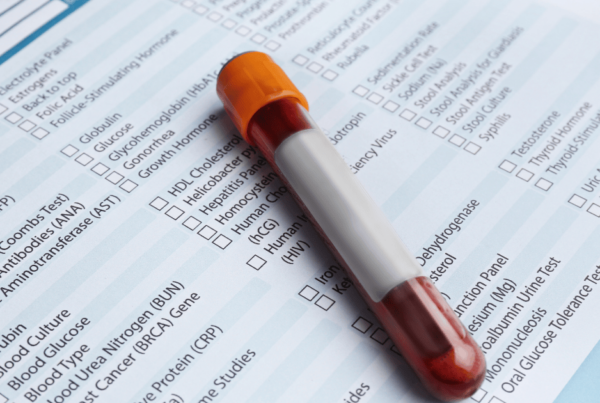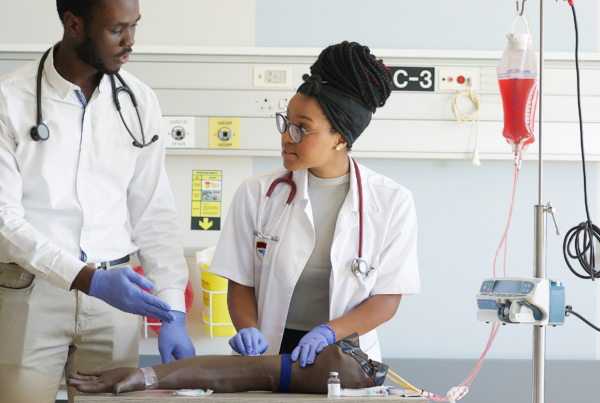Considering a career in healthcare? Has the question “Are phlebotomists in demand?” ever crossed your mind? The answer is a resounding yes! Phlebotomy is a rapidly growing field offering a secure and fulfilling career path for those interested in patient care. This guide explores the current job market for phlebotomists, highlighting the high demand and exciting opportunities available.
| Key Takeaways: Are Phlebotomists in Demand? |
| Phlebotomy is a rapidly growing healthcare field with high demand and job security. |
| The Bureau of Labor Statistics projects an 8% growth in phlebotomy jobs by 2032. |
| Phlebotomists enjoy competitive salaries, flexible work schedules, and the opportunity to make a difference in patient care. |
| You can become a qualified phlebotomist by completing an accredited training program and obtaining certification. |
| Phlebotomists work in various healthcare settings, offering diverse career opportunities. |
The High Demand for Phlebotomists
The healthcare industry is experiencing a surge in demand for skilled phlebotomists. This is caused by numerous factors, including:
- An aging population: As the population ages, the need for medical testing, including blood draws, increases significantly.
- Technological advancements: New diagnostic tests and procedures often require blood samples, creating a greater demand for phlebotomists.
- Retiring workforce: A significant portion of the current phlebotomy workforce is nearing retirement age, leading to job openings.
The Bureau of Labor Statistics (BLS) projects an 8% growth in phlebotomist jobs from 2022 to 2032, which is faster than the average for all occupations [BLS Phlebotomist Job Outlook]. This translates to roughly 19,500 job openings for phlebotomists each year [BLS Phlebotomist Job Outlook].
Benefits of a Phlebotomy Career
- High Demand and Job Security: As discussed, the phlebotomy field offers a secure career path with consistent job openings. Are phlebotomists in demand? Absolutely!
- Competitive Salaries: Phlebotomists can earn competitive salaries, with the median annual wage exceeding $41,810 per year according to the BLS.
- Flexible Work Schedules: Phlebotomists often enjoy flexible work schedules, including full-time, part-time, and evening or weekend hours.
- Quick Training: Phlebotomy programs can be completed in as little as 1 or 2 days with Phlebotomy Now, allowing you to enter the workforce quickly.
- Meaningful Work: Phlebotomists play a vital role in patient care by providing blood samples essential for diagnosis and treatment.
Becoming a Phlebotomist: Steps to Success
Here’s a roadmap to becoming a qualified phlebotomist:
- Earn Your High School Diploma or GED: A high school diploma or GED is required for most phlebotomy programs.
- Enroll in an Accredited Phlebotomy Program: Look for programs accredited by reputable organizations to ensure quality education.
- Phlebotomy Now School Advantage: Our accredited program provides comprehensive training in phlebotomy techniques, patient care, and lab procedures.
- Hands-on Training: Our program emphasizes hands-on experience, preparing you for the realities of the job.
- Obtain Phlebotomy Certification: After program completion, pass a national certification exam to validate your skills.
- Phlebotomy Now School Support: We offer guidance and resources to help you prepare for and pass your certification exam.
- Start Your Rewarding Phlebotomy Career: With your diploma and certification, you’ll be qualified for entry-level phlebotomy positions.
Work Environments for Phlebotomists
Are phlebotomists in demand in various settings? You bet! Phlebotomists can find employment in a variety of healthcare settings, including:
- Hospitals
- Clinics
- Doctor’s offices
- Blood donation centers
- Urgent care centers
- Long-term care facilities
Phlebotomy Skills and Responsibilities
As a phlebotomist, your primary duties will involve:
- Drawing Blood and Bodily Fluids: Using proper techniques, you’ll collect blood samples for various diagnostic tests.
- Patient Care: You’ll ensure patient comfort and provide clear instructions before, during, and after the blood draw.
- Lab Preparation: You’ll prepare blood samples for transport and testing according to established protocols.
- Inventory Management: You’ll maintain adequate supplies and equipment for phlebotomy procedures.
- Record Keeping: You’ll accurately document patient information and blood draw details.
A Day in a Phlebotomist’s Life
While the specific duties of a phlebotomist can vary depending on the work environment, here’s a general idea of what a typical day might look like:
- Morning: You’ll arrive at the clinic or hospital and prepare your workspace, ensuring all equipment is sterilized and supplies are stocked. You might also review patient charts to familiarize yourself with any specific requirements for upcoming blood draws.
- Patient Interaction: Throughout the day, you’ll interact with patients in various stages of the blood draw process. This may involve:
- Greeting patients: You’ll warmly welcome patients and explain the blood draw procedure in a clear and reassuring manner.
- Verifying identification: You’ll confirm patient identity using medical records and identification bracelets.
- Preparing the patient: You’ll help the patient find a comfortable position and apply a tourniquet to locate the vein.
- Performing the blood draw: Using proper aseptic technique, you’ll insert the needle and collect the blood sample.
- Post-draw care: You’ll apply pressure to the puncture site, offer pain relief as needed, and ensure the patient feels comfortable before they leave.
- Lab Processing: After collecting blood samples, you’ll:
- Label samples accurately with patient information and test requirements.
- Centrifuge blood samples as needed to separate components for testing.
- Properly package and transport samples to the laboratory for analysis.
- Documentation: You’ll meticulously document the blood draw procedure in patient charts, including the date, time, type of sample collected, and any observations during the process.
- Inventory Management: Throughout the day, you’ll be responsible for maintaining adequate supplies of needles, tubes, tourniquets, and other phlebotomy equipment.
- Cleaning and Sterilization: Maintaining a sterile environment is crucial. You’ll properly clean and disinfect equipment and surfaces after each blood draw.
Phlebotomy: Beyond the Blood Draw
While blood draws are a central responsibility, phlebotomists often play a broader role in patient care. They may:
- Assist with other diagnostic procedures, such as collecting urine or stool samples.
- Help patients feel comfortable and manage anxiety during procedures.
- Answer basic patient questions about blood tests and phlebotomy procedures.
- Maintain a positive and professional demeanor, contributing to a welcoming healthcare environment.
Phlebotomy Specialties
The field of phlebotomy offers various specialization options, allowing you to tailor your career to specific areas of interest. Here are a few examples:
- Pediatric Phlebotomist: Working with children requires a unique approach and specialized skills to ensure a positive experience for young patients.
- Gerontological Phlebotomist: Drawing blood from elderly patients often requires additional care and consideration due to potential health concerns.
- Mobile Phlebotomist: Some phlebotomists travel to patients’ homes or workplaces to collect blood samples, offering convenience for patients who struggle to visit a clinic.
- Blood Bank Phlebotomist: Working in blood donation centers involves collecting blood for transfusions and requires specific training in blood donation procedures.
Phlebotomy: A Gateway to Other Healthcare Careers
A phlebotomy certification can serve as a springboard to other healthcare professions. With additional education and training, you might consider pursuing careers as:
- Licensed Phlebotomy Technician (LPT): LPTs have expanded responsibilities compared to phlebotomists, including performing certain laboratory tests.
- Registered Nurse (RN): Registered nurses provide comprehensive patient care, including administering medications, monitoring vital signs, and assisting doctors.
- Medical Laboratory Technician (MLT): MLTs work in laboratories analyzing blood, tissue, and other body fluids to diagnose and monitor medical conditions.
FAQs
Are there any prerequisites for becoming a phlebotomist?
In most cases, a high school diploma or GED is required to enroll in a phlebotomy program.
What is the duration required to become a certified phlebotomist?
Phlebotomy programs can be completed in as little as 1 or 2 days with Phlebotomy Now.
What kind of certification do I need to become a phlebotomist?
After completing your phlebotomy program, you’ll need to pass a national certification exam. Phlebotomy Now School can provide guidance on choosing the right certification for your career goals.
What are the career advancement opportunities for phlebotomists?
With experience and additional training, phlebotomists can pursue roles as phlebotomy technicians, lead phlebotomists, or phlebotomy instructors. Some phlebotomists also use their experience as a stepping stone to other healthcare careers, such as nursing or laboratory science.
Is Phlebotomy Now School the right choice for me?
Phlebotomy Now School offers a comprehensive and accredited phlebotomy program designed to prepare you for success in the field. Our focus on hands-on training and personalized support sets us apart. Contact us today to learn more about our program options and see if it aligns with your career goals.
Conclusion
The phlebotomy field offers a dynamic and rewarding career path for those interested in healthcare. With its high demand, competitive salaries, and diverse work environments, phlebotomy is a smart choice for individuals seeking a stable and fulfilling career. If you’re looking to make a vital contribution to the healthcare industry and enjoy daily interaction with patients, then phlebotomy might be the perfect fit for you.
Phlebotomy Now School: We Can Help You Get Started
Phlebotomy Now School is dedicated to helping aspiring phlebotomists achieve their career goals. Our accredited program equips you with the knowledge, skills, and experience needed to succeed in the field. Contact us today to learn more about our program options and take the first step towards your rewarding career in phlebotomy!
Disclaimer:
The information in this handbook is for informational purposes only and should not be interpreted as medical advice. Please consult with a healthcare professional for any questions or concerns regarding phlebotomy or your career path.
Are phlebotomists in demand?
Absolutely. Start your journey today and become an essential part of the healthcare team.







